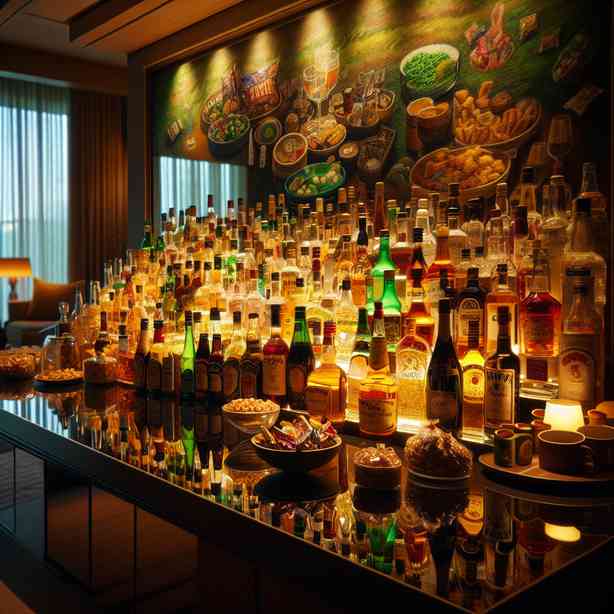
In the world of hospitality and travel, the mini bar often stands as a symbol of both luxury and temptation. It is a small, curated selection of beverages and snacks, available in the comfort of one’s hotel room. For many travelers, the mini bar can serve as a delightful indulgence; however, it can also present a moral quandary or financial burden. Understanding the dual nature of mini bars – as a source of comfort and a potential source of temptation – is essential for today’s savvy traveler.
Firstly, many hotel guests view the mini bar as a convenience. After a long day of travel or meetings, the ability to reach into the mini bar and grab a refreshing drink without stepping out of the room is undeniably appealing. High-quality products, such as an assortment of wines, local craft beers, or artisanal snacks, often line the shelves, offering a taste of local culture and a touch of luxury. This convenience can make a weary traveler feel pampered, turning a simple hotel room into a personalized retreat. However, it is vital to remember that such convenience often comes at a premium price, which can turn pleasurable indulgence into an overwhelming expense if one is not careful.
Moreover, hotel mini bars can be a source of temptation, especially for those who are conscious of their spending or watching their diet. The limited selection, combined with intriguing item placement, can make it all too easy for guests to indulge on impulse. A simple glance at the array of snacks or a chilling drink perched invitingly can often trigger that craving for a little treat. This is particularly true for items that appeal to specific cravings: salty chips, sweet candies, or a chilled bottle of champagne can become objects of desire, leading guests to forego their usual restraint. The psychological aspect of impulse buying in the context of hospitality can be a fascinating study, as it reflects human nature’s inherent tendencies toward indulgence.
Additionally, the allure of the mini bar is often exacerbated during special occasions or vacations. Celebratory moments, like anniversaries or friends’ reunions, can boost the desire to savor those little luxuries, blurring the line between a responsible splurge and reckless abandon. Hotels know this and often cater to these emotions by strategically stocking their mini bars with premium items at peak prices. Consequently, it’s important for guests to navigate their choices carefully, considering whether their indulgence aligns with their budget and values.
To manage the temptations that mini bars offer, one may consider establishing a pre-trip plan. By setting a spending limit or deciding which special treats to allow oneself beforehand, guests can help mitigate impulsive purchases that come from an emotional response to the allure of shiny wrappers or colorful drink labels. Moreover, seeking out local shops or eateries for similar items can often provide not only a more affordable option but also a unique flavor of authenticity that hotel mini bars may lack.
As mini bars are a unique feature of modern lodgings, many travelers might find it helpful to understand the typical pricing structure. Most hotels charge a significant premium for items sold in their mini bars, with prices that can sometimes be several times higher than retail. For example, a standard bottle of water might cost $5 in a mini bar, compared to a mere $1 from a nearby convenience store. Recognizing this discrepancy can help guests think critically about their consumption habits and potentially encourage them to opt for alternatives where feasible.
Reviewing the impact of mini bars in hotel experiences can also shed light on their role and effectiveness in enhancing guest satisfaction. For hoteliers, mini bars represent not just a revenue stream but also an opportunity to increase the overall perception of value. When stocked thoughtfully, mini bars can enhance the guest experience, making a stay memorable and personalized. It can be beneficial for hotels to think about not only what items to include, but also how they present them. Attractive presentation and clear pricing can heighten the drinking or snacking experience.
Moreover, with the shift toward healthier lifestyles and dietary preferences, many hotels have begun to adapt their mini bar offerings to include healthier, low-calorie, and organic products. Guests can now find options like sparkling water, healthy nut mixes, and even gluten-free snacks alongside conventional items. This shift caters to a newer demographic of health-conscious travelers who seek to maintain their dietary habits even while on the road.
In conclusion, the mini bar epitomizes a duality inherent in the travel experience: it is both a source of indulgence and a potential temptation. As guests enjoy the various offerings within a mini bar, it is important to strike a balance between enjoying life’s luxuries and exercising self-control. By establishing guidelines for oneself, recognizing pricing differences, and being mindful of the items that tempt us, travelers can navigate the saturated world of mini bars while maximizing enjoyment without undue expense. Ultimately, the mini bar can serve as a delightful element of a luxury stay, provided that one’s approach to it is both intentional and thoughtful.


